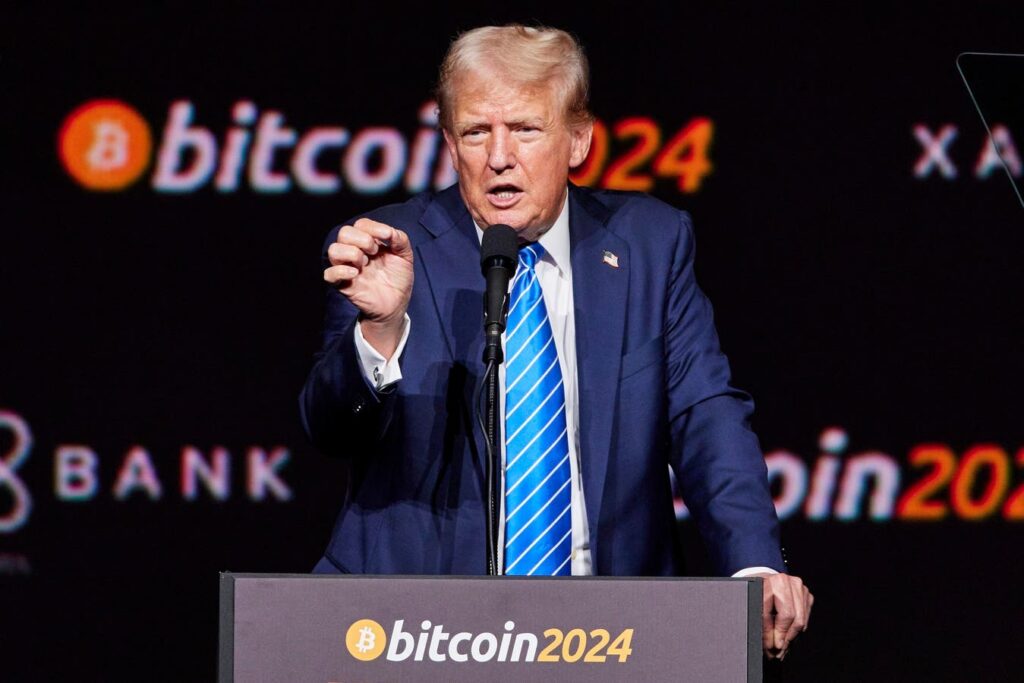Donald Trump pledges to make the United States the “crypto capital of the planet” at the Bitcoin 2024 conference in … (+)
With Donald Trump returning to the White House, the crypto landscape could be on the cusp of a major transformation. Trump’s pro-Bitcoin stance, commitment to crypto regulatory reform, and vocal opposition to central bank digital currencies suggest that U.S. crypto leadership could strengthen significantly in the years to come.
A strong push for Bitcoin
Throughout his campaign, Trump openly supported Bitcoin, aiming to make the United States the “crypto capital of the planet.” He even proposed integrating Bitcoin into the country’s financial strategy by creating a national Bitcoin reserve. This pro-Bitcoin stance aligns with Trump’s view that the United States should take the lead in digital finance.
Big companies poised for gains
Despite years of political and regulatory challenges, the United States remains a powerhouse for crypto-focused businesses, driving significant economic impact. Leading players like BlackRock and Fidelity are pioneers of tokenized funds, while VISA and Mastercard offer credit cards linked to crypto wallets, demonstrating mainstream adoption. US cryptocurrency exchange Coinbase, with revenue of $4.3 billion in the first three quarters of 2024, underlines the scale of the sector. In the second quarter of 2024 alone, stablecoins traded $8.5 trillion, surpassing Visa’s $3.9 trillion, driven in part by U.S.-based issuers like Circle, Paxos, and PayPal. This leadership highlights the important issues in terms of regulatory clarity.
Some major U.S. companies are driving global crypto innovation despite regulatory hurdles, including … (+)
Clarity of crypto regulation
Under Trump, the regulatory landscape could undergo significant changes. Trump has pledged to dismantle what he sees as restrictive regulations, starting with the firing of SEC Chairman Gary Gensler, whom he criticizes for the “regulation by enforcement” approach. Trump could establish simpler, growth-oriented policies by appointing a more crypto-friendly SEC leader. Christopher Perkins, president of CoinFund, a New York-based crypto investment firm, highlights this momentum by noting: “The elections in the United States have been extremely positive for the crypto industry. Although Trump has indicated that he will be crypto president, it is important to note that 261 pro-crypto candidates have been elected to Congress. This is the first “crypto” congress. Perkins emphasizes: “We expect clear regulation, but not overly prescriptive regulation,” describing the outlook as “very optimistic for the crypto industry – period.”
US SEC Chairman Gary Gensler at a 2023 House Financial Services Committee hearing on the lawsuits. … (+)
CBDC efforts questioned
Trump’s opposition to central bank digital currencies (CBDCs) is clearly rooted in concerns about privacy and individual liberty. He supported the CBDC Anti-Surveillance State Act, which prevents the Federal Reserve from issuing a CBDC without congressional approval – a position echoed by Fed Chairman Jerome Powell. Trump’s anti-CBDC stance could also significantly influence global trends as central banks like the European Central Bank make progress with their digital currencies. The ECB’s proposed CBDC, designed to provide accessible and standardized payments across the eurozone, has so far received limited policy attention in Europe, despite concerns about its potential to crowd out the private sector. However, Jonas Gross, president of the Digital Euro Association, believes that Trump’s vocal stance could be a game-changer: “If Trump speaks openly against CBDCs, we could see more discussions in the European Parliament,” suggests he said, indicating that Trump’s influence could lead to increased scrutiny. of the ECB’s approach.
The ECB, led by Christine Lagarde, is developing a CBDC for the eurozone – a form of digital currency … (+)
Global competition is intensifying
Europe has led the way in crypto regulation, with Markets in Crypto-Asset Regulation (MiCAR) expected to come into force by the end of the year. Joachim Schwerin, senior economist at the European Commission, notes that Europe’s regulatory path reflects its commitment to “balanced and sustainable crypto growth,” a stance that has already attracted major U.S. crypto companies to searching for European MiCAR licenses. Even though Trump’s re-election could create a more favorable regulatory environment for cryptocurrencies in the United States, Schwerin believes that the European approach will remain stable. However, he acknowledges that global competition is intensifying, with countries like the Emirates and Switzerland establishing strong frameworks to attract crypto innovation.
Crypto enables global transactions across borders and promotes international competition for humans. … (+)
Trump’s election marks a new era of crypto
Despite past regulatory challenges, the United States has built a strong crypto sector, with major U.S. players driving growth and innovation. The election of Trump could unlock even greater potential in establishing crypto-friendly regulations. With a pro-crypto Congress and supportive regulators, the United States could strengthen its lead and become the leading global hub for decentralized finance. Trump’s anti-CBDC stance could also shape global discussions, prompting central banks to reconsider centralized models. Together, these changes could position America as a leader in digital finance, operating in a competitive landscape in which Europe has already laid important regulatory foundations.
Yet, as Rhys Bidder, deputy director of the Qatar Center for Global Banking and Finance, observes: “There have been false dawns for crypto before… the hope must be that the industry grows sustainably. » With this new US administration, crypto has a unique opportunity to prove that it is a mature and credible sector, dispelling doubts and moving beyond its volatile past.




